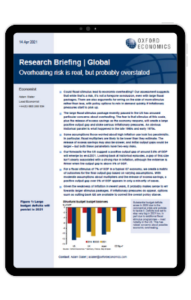Global | Overheating risk is real, but probably overstated

Could fiscal stimulus lead to economic overheating? Our assessment suggests that while that’s a risk, it’s not a foregone conclusion, even with large fiscal packages. There are also arguments for erring on the side of more stimulus rather than less, with policy options to rein in demand quickly if inflationary pressures start to pick up.
What you will learn:
- Multipliers are also likely to be low for other stimulus
categories too, including aid to businesses (well below 1
according to the Congressional Budget Office). - An important component of the argument for overheating is the existence of a large overhang of “excess” savings built up in 2020 due to coronavirus restrictions.
- A key determinant of whether a fiscal package risks overheating an economy is, in theory, the size of the output gap (the difference between actual output and its potential level).
Tags:
Related Services

Post
What a fragile peace means for Central and Eastern Europe
Countries in Central and Eastern Europe (CEE) have been among the most exposed to Russia's war in Ukraine and will also be impacted by the nature of any ceasefire. Our baseline assumption is for 'fragile peace' this year, with a high likelihood of renewed hostilities.
Find Out More
Post
Which regions are most exposed to the 25% automotive tariffs?
While the automotive tariffs will likely lead to some production being reshored to US plants, they will also raise costs for US manufacturers and households.
Find Out More